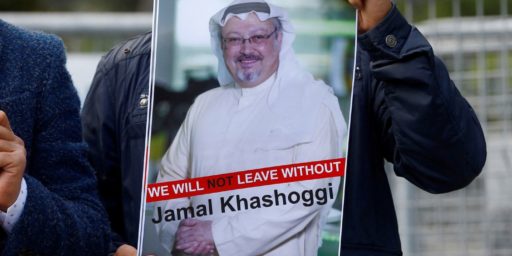THE LONG SHORT WAR
Is the title of a forthcoming book by Christopher Hitchens* a taste of which is in this Slate column. He makes two important points. The first is quite counterintuitive** — the fact that we haven’t found WMD means the war was a success:
. . . if nothing has been found so far, and if literally nothing (except the mobile units predicted and described by one defector) is found from now on, it will mean that the operation was a success. The stuff must have been destroyed, or neutralized, or work on it must have been abandoned during the long grace period that was provided by the U.N. debates. One senior U.N. inspector adds a caveat to that, which is worth stressing. The intention of the regime to acquire weapons at some point, or to reacquire them, should not be doubted. There are many blueprints and many brains and many computer discs full of know-how. These would be nearly if not actually impossible to discover, and they will now not be reassembled by a Baathist government. Thus if you take my line of the “long short war,” and a timeline of 1990 to 2003, Saddam Hussein went from being a threshold nuclear potentate with the capacity to invade Kuwait to an ex-potentate unable even to deploy his Republican Guard. This was the outcome of a series of measures, from sanctions to bombing, designed to create the conditions for regime change or to make regime change (desirable for numberless other reasons) possible. The anti-war movement opposed even the sanctions at first and the military part of the operation at all times. But Iraq is now disarmed, and who will argue that it was not the believable threat of intervention that brought this about?
Excellent point, although still a troubling argument from a public relations standpoint.
The second point Hitchens makes is more obvious but still missed by many observers who should know better:
. . .anti-war Democrats and some others are now saying that the world has nonetheless been made more dangerous because of the threat of additional terrorism. . . . As to the terrorists who (remember?) had “no connection” to Saddam Hussein, they seem moved nonetheless to take revenge for his fall. Can that possibly mean they feel they have lost a friend?
Let us skip over this obvious point and inquire about what they managed. In Saudi Arabia, which is a fertile place for anti-Western feeling of all sorts, they managed to kill a number of Saudi officials and bystanders while inflicting fairly superficial damage on Western interests. Widespread and quite sincere denunciation of this has been evident across Saudi society. While in Morocco, where the evidence for an al-Qaida connection is not so plain, whatever organization did set off the suicide attacks in Casablanca has isolated itself politically. Please try to remember that al-Qaida and its surrogates are engaged in a war with Muslims as well: They boast of attacking the West in order to impress or intimidate those Muslims who are wavering. But they are steadily creating antibodies to themselves in the countries where they operate. The jihadists who murdered tourists in Egypt were widely execrated and not just because they threatened to ruin the tourist industry. The Bali bombers in Indonesia caused something of the same effect. The recent suicide atrocities in Jerusalem and Tel Aviv were clearly directed, by their timing, against elements in the Palestinian Authority who want to make a deal.
Indeed.
*Unfortunately, not with my publishing company.
**A fancy academic word that means “surprising.”




